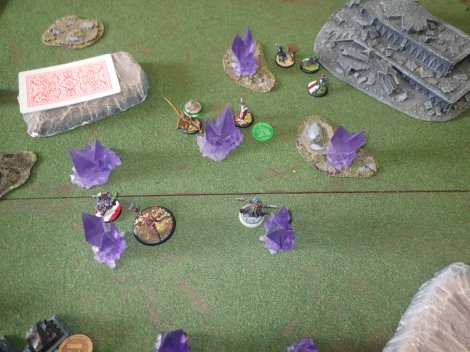Hi folks,
After last post, chatting with @Beardminis about his issues with what he said he’d do at Nationals vs what he fancied doing, I convinced myself that actually the correct approach (for me) is to take all my toys to play with, but to have my fixed crew as a safety net for when exhaustion hits. So there you go, expect Kaeris, Marcus, maybe even Sandeep will give a showing… maybe.
Preamble complete, time for the real subject of the post: gaming etiquette, and how my nice nature could hamper the winning of games.
Malifaux is a game of open information. At any point you can measure anything, ask your opponent to clarify a point, show you a card, or explain how an action works. Therefore the only unknown should be what cards are in your opponent’s hand, and both decks (unless you’re particularly hot on card counting).
But we’re only human, people forget stats/triggers/abilities, and forget to ask about them, but how much information “should” one provide to one’s opponent? Time for an example:
My opponent wants to attack a gunsmith. There are 4 key bits of information they might want to know: the defence stat, the number of wounds, the details of the defence trigger, the fact that it has hard to wound. So, they declare an attack, do I stay silent or tell them about some/all of the above?
Usually I find my opponent asks what the defence stat is, how many wounds it has, and sometimes if there’s a trigger. So, following the rules, I provide the information they ask for. I believe I have no obligation to tell them the gunsmith has hard to kill, as they haven’t asked. Being me however, I do tell them, because it may totally change their decision to attack or not, and therefore it is important to them that they know. In the same breath, I am potentially giving away the VP which that gunsmith might score by remaining alive due to hard to kill. To me it seems dishonest not to inform my opponent of this. A few tournaments ago this exact thing occurred against @Mcfauxish’s Somer crew, where I forgot to mention Hard to kill, and I felt very bad for having effectively wasted Ross’s AP attacking a model he couldn’t kill that turn. But isn’t that part of the game?

My Gunsmith survives from turn 2 to the end of the game with 1 wound due to me forgetting to tell Ross it has Hard to Kill. Am I a filthy cheaty horrible swine?
Fast forward a few tournaments, and we have another situation. Marcus has turned my Kaeris into a beast, and she’s now stood next to him on negative flips to all duels. Being an idiot, I forget that Marcus has a defensive trigger to redirect attacks onto nearby Beasts, and so I charge Marcus with a Union Miner, and don’t mention that improvised weapon ignores defensive triggers, because I didn’t think it was relevant (again, due to me being a forgetful moron). My opponent doesn’t tell me about the defensive trigger, and attack number 1 goes in. He cheats in a tome, and only when totals are calculated declares his trigger (as is the correct way in the rules). As a response, I tell him that he can’t declare triggers due to the Union Miner’s improvised weapon, and Marcus swiftly dies with a pickaxe in his face. Interestingly, if I had remembered that Marcus had a defensive trigger in this case, I would have told my opponent that the Miner will ignore it, and therefore Marcus would probably have been a bit better off (not necessarily alive, but better off). So in this case, with both of us not mentioning abilities, I gained considerably by killing his master.
In my humble opinion, it’s a bit of a dick move to not tell your opponent about triggers/hard to kill etc before they commit to an attack/charge (both of the above examples being things I forgot, and then felt exceedingly bad about). But at the same time, surely I’d be better off if I could surprise my opponent with a bit of hard to kill when they weren’t expecting it.
So, my question is, when is “hiding” (not telling unless explicitly asked) information fair, and when is it being a big bar-steward? Am I just a soppy idiot, and should keep this kind of information from my opponent all the time unless asked? Is this why I loiter at the bottom tables?
Comment below
Until next time
Dave/sssk

I’m with your current way of playing. Being that Malifaux is a game of open-information (except for those 2 exceptions), I don’t believe that “memory” should be a skill necessary to play skillfully, and so whenever my opponent asks what the Df of a model is, I provide all of the relevant defensive stats.
If we imagine a world where memory IS a crucial skill, but the game is still open-info, then I believe that games would slow to a crawl as every action requires that you ask “Whats the Df? Any Df triggers? Hard to kill? Impossible to Wound? Oh hell just give me the card for the 5th time this round.”
Winning due to purposefully not providing this information will lead to me not playing that person again. Which is as much my choice as it is their choice to play their way.
While I appreciate and play following the kind of etiquette you’re describing here, I would not expect it at a tournament. This said, I purposely do not play at tournaments. Maybe, if all touraments partecipants would be like you, I’d start playing at tournaments 🙂